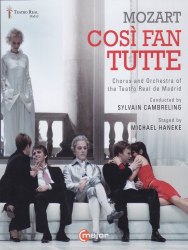| 
|
Wolfgang Amadeus MOZART (1756 - 1791)
Così fan tutte
Anett Fritsch (soprano) - Fiordiligi; Paola Gardina (mezzo) - Dorabella; Andreas Wolf (baritone) - Guglielmo; Juan Francisco Gatell (tenor) - Ferrando; Kerstin Avemo (soprano) - Despina; William Shimell (baritone) - Don Alfonso
Chorus and Orchestra of the Teatro Real de Madrid/Sylvain Cambreling
Staged by Michael Haneke; Set Design: Christoph Kanter; Costume Design: Moidele Bickel; Lighting: Urs Schönebaum; TV Director: Hannes Rossacher
rec. Teatro Real de Madrid, March 2013
Bonus: kulTour with Holender: Michael Haneke
Filmed in HD, Mastered from an HD Source
Picture format: NTSC 16:9; Sound formats: PCM 2.0; DTS 5.1; Subtitles: Italian, English, German, French, Spanish, Dutch, Korean; Subtitles - Bonus: German, English, French
Region code: 0
C MAJOR 714508 DVD [2 DVDs: 202:00 (opera) + 18:00 (bonus)]
What are they going to do with old Così fan tutte this time? I can anticipate the question. I almost always nowadays pose it myself before opening a DVD box, or for that matter entering an opera house. You get a clue when you look at the box cover: modern outfit, trendy young people. Wait a moment: in the midst of the quartet that we know will ‘change partners’ as soon as the curtain is up, sits a middle-aged man in late 18th century costume. A remnant from times long past? In a way. This is Don Alfonso, the old philosopher and cynic who is the instigator of the following proceedings. In the background we see an enigmatic woman, all white. Must be Despina, the maid who assists Don Alfonso in all the pranks - even takes over as the motor in due time. Timeless, enigmatic. Greek columns further back but the sofa in the foreground is much softer and cosier than ancient marble benches.
A look in the booklet only adds to the confusion. We find there a poem by Rainer Maria Rilke Cupid (1924) and a long list of ‘Whys’ put together by the director Michael Haneke in February 2013. I can’t resist quoting it:
Why has well-to-do Don Alfonso married only Despina,
who is, after all, a stranger twenty years younger than he is?
Why does he think that she’s cheating on him?
Why does he have to humiliate her?
Why does she have to humiliate him?
Why has he had his beautiful old manor house ‘modernized’?
Why is he holding a house-warming party for his friends
in the form of a fancy-dress ball?
What is he trying to prove? And to whom?
Why is Despina so sad?
Why are the lads so certain of their lasses?
Why are the girls so annoyed in consequence?
Why are they all so desperate, so grimly determined and so proud?
Interesting questions and insinuations: I didn’t know that Don Alfonso married Despina. I find reference to this nowhere in the original libretto but it explains why Don Alfonso kisses Despina, passionately, and she doesn’t exactly regret it. The questions also displace focus, insofar as the matrimonial crisis of the oldies becomes the kernel of the drama and the antics of the young party people become plain entertainment, to cheer up the crisis.
Maybe one shouldn’t go that far and with Mozart’s musical psychology the ‘entertainment’ also becomes deeply human - but the perspective is still interesting. Whatever one’s objection to this and that in the direction and the overall concept, everything is carried through expertly and consistently: sets, lighting and all that, so let’s disregard the philosophy and get entertained.
There is a lot to enjoy - though it’s totally unrealistic, or call it absurd. It is refreshing to see the two soldiers-turned-Albanians returning in disguise - the only difference is that they have added a moustache. There is a lot more of this kind but let me not linger on such things - they should be experienced without prejudice. Lean back and savour. All six singers act convincingly - in particular Don Alfonso and Despina, the latter a really brilliant actor and a terrific singer, even though some tough roles may have taken their toll. Splendid singing is also delivered by Anett Fritsch, whose Fiordiligi is younger than most and the fearsome Come scoglio is impressively assured. About Juan Francisco Gatell I have some reservations, though. He has an agreeable voice and a serviceable technique but is afflicted by a tiresome vibrato. Un aura amorosa is basically well sung but not in any way remarkable. Andreas Wolf’s Guglielmo on the other hand is a vocal charmer, sonorous and expressive, remotely reminiscent of the legendary Erich Kunz, who was Guglielmo on the old Decca recording from the mid-1950s, which was my first Così. Il core vi dono is truly romantically sung. Paola Gardina’s Dorabella is a bit over-vibrant for my taste but more than acceptable. As for William Shimell he has been one of the foremost Mozarteans for many years, not least in the title role of Don Giovanni, which he recorded with Riccardo Muti for EMI more than twenty years ago. With his stage presence and timing he supervises the unfolding of the conflicts superbly.
A young cast is always welcome in this comedy about young lovers, and visually this production is closer to the mark than most. None of the four is as yet an established world star but the freshness of the acting and singing is compensation enough.
Personally I prefer listening rather than listening and viewing this opera, but when the day comes that I feel compelled to view as well I might very well choose this DVD.
Göran Forsling
Previous review (Blu-ray): Robert Farr
 |
 |
|



 All Nimbus reviews
All Nimbus reviews








